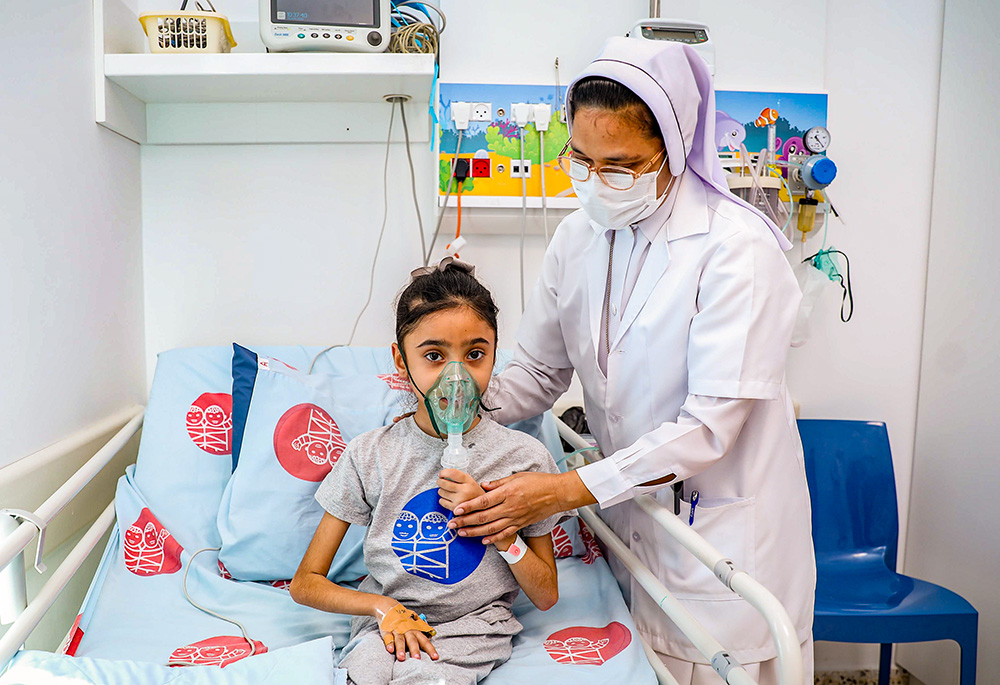
Charity Sr. Bency Paul helps a young patient at Caritas Baby Hospital Bethlehem in the West Bank. (Courtesy of Caritas Baby Hospital/Andreh Ghawaly)
For Charity Srs. Aleya Kattakayam, Bency Paul, Felicita Pohkynteng and Theresia Crasta, serving their calling as nuns and nurses at the Caritas Baby Hospital Bethlehem is an honor and a grace that is not given to everyone. It provides them with a unique connection not only to Jesus in the place where he was born, but also to Mary, who as a woman in all her simplicity was chosen as the mother of Jesus.
By following their vocation caring for the children and mothers of Bethlehem and the surrounding area who come to the hospital for medical care, they have been called to be sister and mother to everyone, they say.
All four of the sisters are originally from India.
"When I come to work with the people who are so very humble, [I am reminded that] God could work through the simplicity of a woman to bring forth salvation to the world," said Kattakayam, the senior sister who also works at the Mother's Residency Unit of the hospital where mothers whose children need longer term care are able to stay for the duration of the treatment.
"When I come here and look at these simple women who bring the children to the hospital, I think of the woman as a mother in her suffering, in her simplicity, in her availability to bring forth life to the world," Kattakayam said. "Her role [as a mother] is something very hidden, but she takes the maximum responsibility. As a sister, I don't feel that I am giving to them, but that I am receiving from the mother."
Caritas Baby Hospital was established in 1953 in Bethlehem as an outpatient clinic by Caritas Switzerland employee Hedwig Vetter, Swiss La Salette Missionary priest Fr. Ernst Schnydrig and Palestinian pediatrician Dr. Antoine Dabdoub.
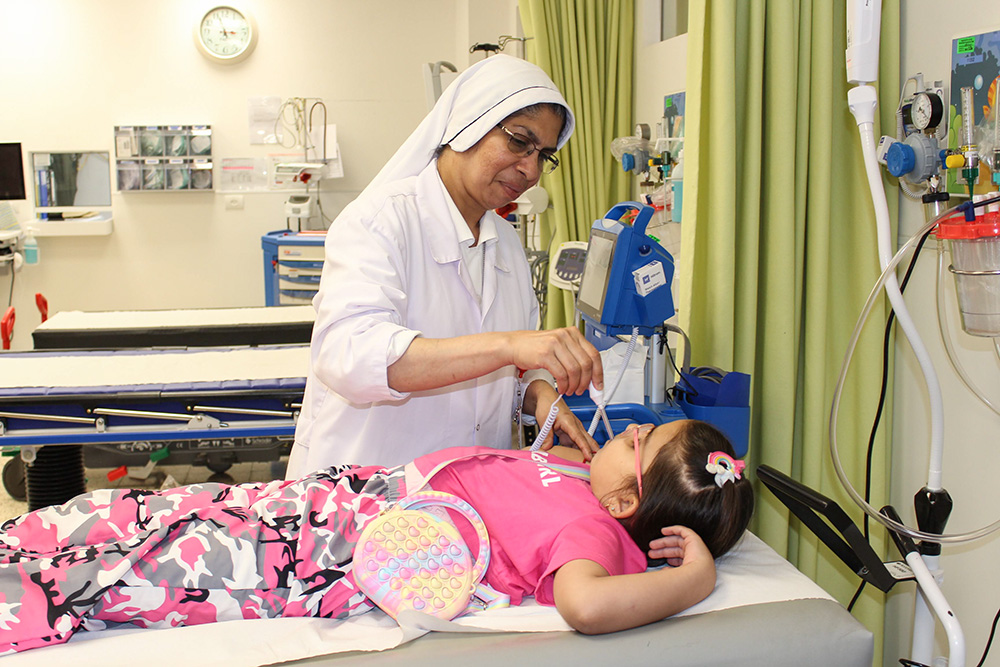
Charity Sr. Felicita Pohkynteng checks the temperature of a young patient at Caritas Baby Hospital Bethlehem in the West Bank. (Courtesy of Caritas Baby Hospital/Marian Nasser)
Today, it is the only pediatric hospital in the West Bank, providing care for around 50,000 children annually in their different clinics. Health conditions range from minor medical issues to chronic illnesses that require major long-term treatments.
Caritas Switzerland and Germany were the initial donors, and since 1963, the hospital has been affiliated with the Swiss nongovernmental organization Children's Relief Bethlehem.
The hospital has had a strong connection with different religious orders of nuns since 1969: the Order of the Holy Cross, the Franciscan Elizabethan Sisters and currently the Sisters of Charity. The sisters are considered an integral part of the hospital's identity. Their presence plays a vital role in spreading the Christian values of love and peace, though the majority of the patients at the hospital come from a Muslim background.
"When they see me they feel more comfortable and at ease to deal with the situation or to speak with me confidentially, especially in the admitting rooms," noted Paul, a practical nurse who speaks Arabic and spent 18 years in Egypt prior to coming to Bethlehem. "Sometimes I see them shedding tears because they are worried. I may not know what the exact problem is, but I show my extra care to them. I show my love and affectionate concern to make them feel at home.
"I cannot do much in any other way. But this way I can give the love of God to these people and they accept it. The people here are very welcoming and especially to us. I experience the welcoming spirit of this Palestinian people."
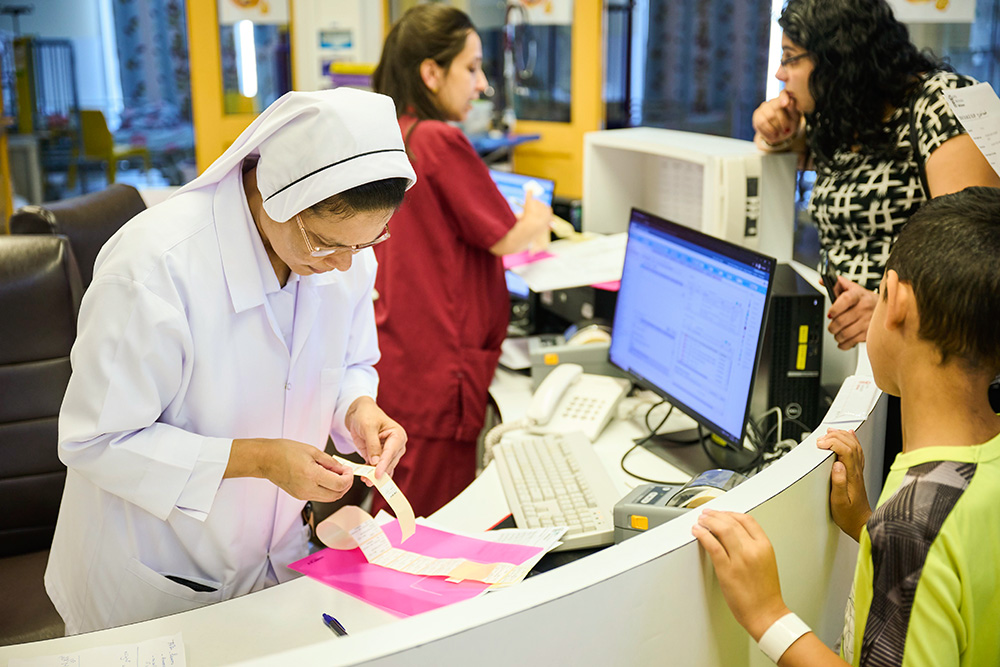
Charity Sr. Bency Paul helps check in patients at Caritas Baby Hospital Bethlehem in the West Bank. (Courtesy of Caritas Baby Hospital/Meinrad Schade)
Being together with the mothers and families who are suffering in many ways — financially or with the challenges of handicapped children — and yet who accept it from the hands of God "willingly and joyfully" also serves as a reminder for her to live her own life happily, she added.
"When we see these children in sickness, in difficulties, naturally my heart goes out to the children and to the mothers. God put these feelings into the heart of the woman to care, to love, to feel, to understand all, to be kind—all these are inborn in women," said Paul. "So I feel that I have to take care. I have to do something for them. I do my utmost, whatever is in my capacity, whatever I can do, I do. I do not draw backward."
Marking its 70th anniversary, the hospital laid the foundation stone for its Jubilee Building for Pediatric Day Surgery in November under the patronage of the Latin Patriarchate of Jerusalem, the Custody of the Holy Land and the Palestinian Ministry of Health. One of the most significant development projects for Caritas Baby Hospital, the new building will house a day surgery department as part of the hospital's 2025 strategy, aimed at addressing pediatric health care needs in Palestine. The facility will provide essential surgical services in a safe, child-friendly environment, supporting children's rights to life and health care amid the region's challenges, according to a press statement by the hospital.
Crasta, a staff nurse, came to Bethlehem following her work in Afghanistan when the Sisters of Charity mission there was closed due to security concerns. She said working in the wards of the Caritas Baby Hospital gives witness to the love they have to share as sisters.
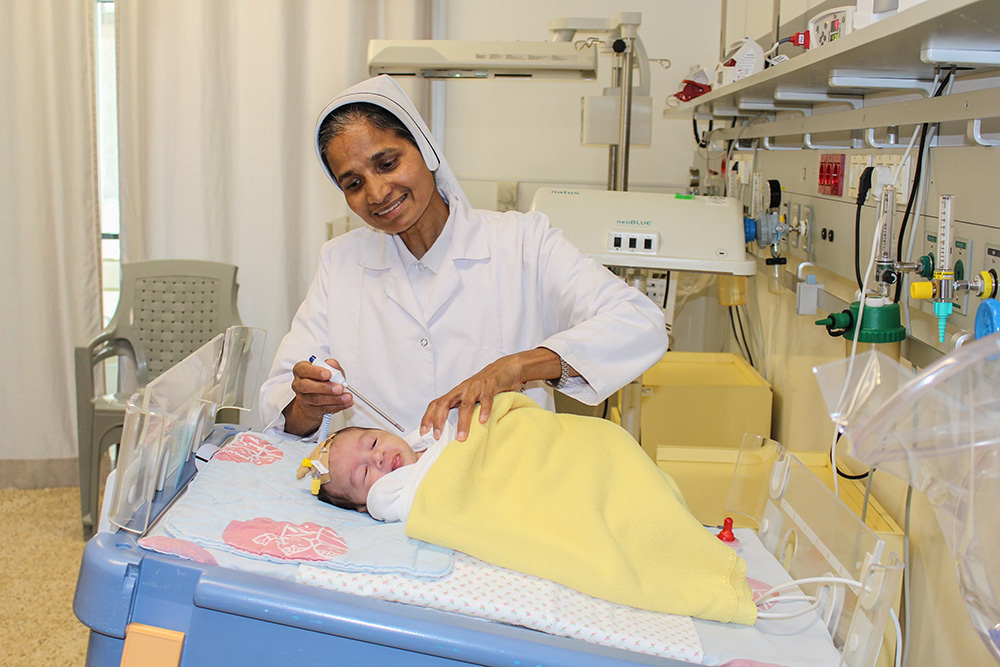
Charity Sr. Theresia Crasta checks the temperature of a patient at Caritas Baby Hospital Bethlehem in the West Bank. (Courtesy of Caritas Baby Hospital/Marian Nasser)
"It is very smooth [for the mothers] leaving the children [in our care] because they know their children are with the sisters. Sometimes they have to leave their child to go eat and it is not easy for them," said Crasta. "So then they see a sister and they ask us to please take care [of their child] and we say, 'Yes, we are here for you.' And they feel a little more secure knowing that a sister, who is also a nurse, is here, too."
For families outside of the Bethlehem-Beit Jala-Beit Sahour triangle, reaching the hospital can involve multifaceted travel, including taking taxis or buses, and Israeli checkpoints. Since the outbreak of war following the Oct. 7 Hamas attack on southern Israeli communities that left 1,200 people dead and 250 people kidnapped, many families in the West Bank have been faced with economic difficulties as Israel prohibited Palestinian workers from entering.
That has made the transportation costs to reach the hospital even more restrictive. So at this time, the hospital's Mother's Residency Department has been especially significant. Each mother has her own private bedroom, with a communal kitchen and an inviting living area designed with comfortable sofas and soft lighting.
Advertisement
Being able to stay at the hospital while her son receives medical treatment has helped her pass the difficult moment more easily, said Amal, a young mother from the Hebron area who asked that her real name not be used. Taking a moment of rest in the department's living room, she said Kattakayam's presence at the department has a calming effect for the mothers, despite the language barrier.
"She gives us what we need," said Amal.
The department also provides mothers a safe space to speak with other mothers and take part in a variety of different talks with hospital staff, such as discussions about breast feeding and child nutrition, or learning about the proper use of antibiotics, said Kattakayam.
Coming from traditional communities, many of them spend most of their time caring for their families and often do not have the opportunity to enrich themselves, she said. With numerous children at home, some with disabilities, it is also difficult for some of the mothers to stay in hospital with their children, she added.
"Many of them do not have the opportunity to see and cultivate their talent — because they are talented," said Kattakayam. "So here they have such an opportunity. It is a safe platform for them to share among themselves. Almost every day they have the opportunity to educate themselves, facilitated by the local staff which speaks their language. I am really proud of our staff and the work they do."
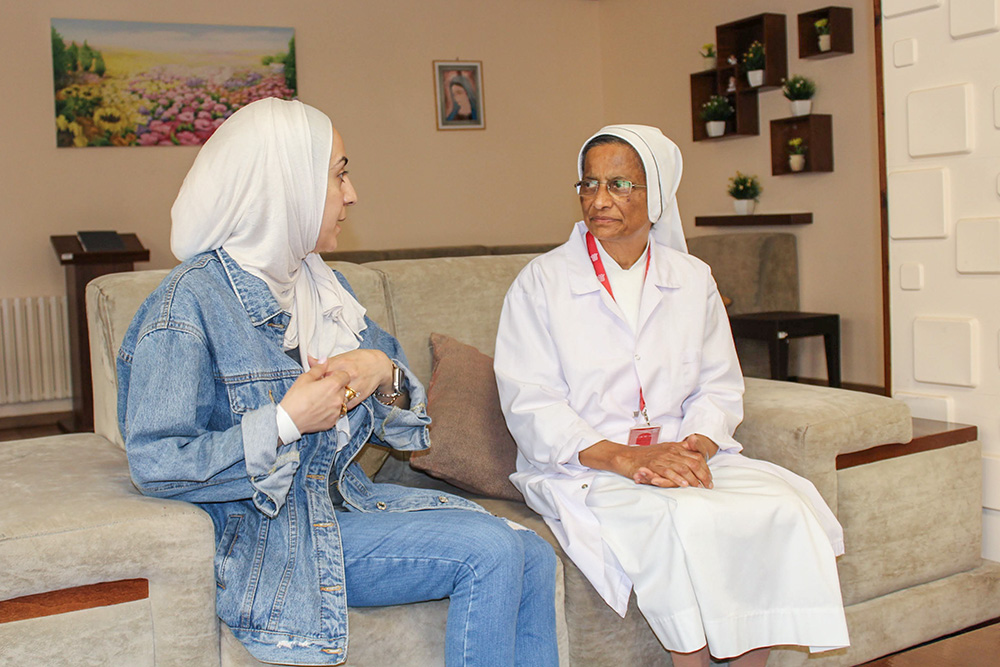
Charity Sr. Aleya Kattakayam talks to a mother of a patient at Caritas Baby Hospital Bethlehem in the West Bank. (Courtesy of Caritas Baby Hospital/Marian Nasser)
Because many of the mothers are from small all-Muslim villages, they may never have come into contact with a Christian or a nun before they came to the hospital, Kattakayam noted. Nevertheless, the hospital, with its historical connection with Catholic orders and the sisters attending to the children and mothers along with the other medical staff, provides a feeling of God's constant presence and stability, she said.
"There is this oneness, there is no difference between us," she said. "We feel that we are giving them hope."
The hospital's mission is to serve everyone in need regardless of their religion, race or color, said Wafa Musleh, manager of the Mother's Residency Department, and having sisters working as nurses treating the patients helps the hospital maintain its identity as a Catholic hospital. With Palestinian Christians having dwindled to about 1% of the Palestinian population, maintaining a Catholic hospital in the heart of Bethlehem, the birthplace of Christianity, is "really wonderful," she said.
"The role of the sisters is to be kind, to help people, to be humble, it is giving. Without [saying] that we are a Christian hospital people recognize it as Christian by the way that we are dealing with people," Musleh said. "The presence of Sister Aleya in the Mother's Residency Department gives a unique service to the patients. The mothers appreciate her presence, and despite the language barrier ... they love and respect her so much."
"The sisters have a different attitude, a different language — not a word language — a different way of treating people," Musleh added. "They have a different way of telling you that you are not alone."







